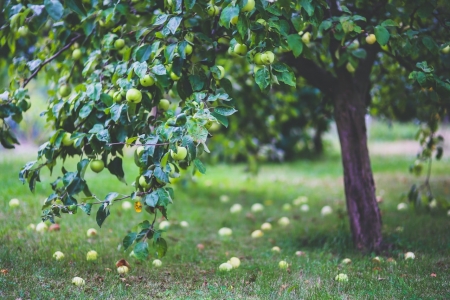Not Your Typical NC Apple Season

You can’t help but think of a breezy fall day in the mountains when you bite into a crisp NC apple.
Every year, North Carolina’s apple season kicks off at the end of August, but due to COVID-19 and its impact, the question remains as to what this apple season will look like.
We spoke with Marketing Specialist Tony Haywood with the N.C. Department of Agriculture and Consumer Services to seek a better understanding of how the pandemic will impact this year’s NC apple season. In his role, Tony brings public awareness to the apple industry and locates sources for NC apple growers to sell their product.
Promoting NC Apples
In a normal season, Tony would be gearing up for in-person events, including face-to-face meetings with apple associations, like the NC Apple Growers Association and the Blue Ridge Apple Growers Association. He would also be hosting live events at farmers markets with apple samplings or blind taste tests. In fact, he has a brand-new wrapped NC Apple graphics trailer for these events that is currently sitting unused.
And there’s a big list of cancelled annual events, like the always-popular NC Apple Festival in Hendersonville, the NC Mountain State Fair in Asheville, and the N.C. State Fair in Raleigh. At these events, Haywood would have hosted apple competitions and handed out blue ribbons for fresh apple quality and apple recipes—from pies to preserves.
Haywood anticipates that January’s annual Southeastern Apple Growers Meeting in Asheville will probably be cancelled, too. Cancellation of this event affects new growers as it offers courses in pesticides, herbicides, apple varieties and grafting. The organizers hope to offer these classes virtually. The NC Farm to School Program, which brings local foods to schools, is also impacted. For apples, the program supplies fresh fruit and educates students where apples come from and how they are grown.
All in all, Haywood is trying to innovate new ways to promote apples other than the norm.
Pandemic’s Impact on Apple Growers
The USDA has not established specific guidelines for apple growers, so each grower has its own set of guidelines, with most growers being very proactive. For example, one Hendersonville grower set-up a clinic, and every migrant worker visits the clinic for a health screening before working on the apple farm. Another grower has workers in teams of six; therefore, if one worker tests COVID-positive, it only impacts the team of six versus the entire workforce. Haywood says the farmers are very conscientious and want to do the right thing.
Bigger growers with packing houses do anticipate COVID-19 will somewhat slow production time, but processing is mostly mechanized. Therefore, effects will be felt more on harvesting than processing.
Selling NC Apples
Many NC apples are sold roadside or at farms, which makes safety easier to manage since the point of purchase is outdoors and often on a farmer’s property. For farms offering public apple picking, Haywood recommends sellers post signage about masks and social distancing and only allow one person or family per orchard row.
Apple growers should continue to have success selling at farmers’ markets. The WNC Farmers Market has not closed during COVID. In fact, its sales are up 30% from last year. The public most likely feels more comfortable in an open air market, with social distancing in place and vendors required to wear masks.
Apple growers who sell to Sysco or US Foods, big food service suppliers, or to wholesalers, who take the food to restaurants and venues, saw food service sales considerably slow down, and Haywood is not certain when those markets will return. He has also seen a slow-down in the need for apples for processing to hard cider.
Long-Term Challenges for Apple Growers?
Haywood was not quick to identify any long-term challenges due to COVID for apple growers. He said, “We’ll have to wait and see. We really won’t know the answer until after the season.” He’s definitely curious to see how it impacts retail sales at roadside stands since they are the biggest outlet for NC apples.
Some possible impacts include: (1) Low sales could affect how apple growers approach next year and (2) a COVID outbreak amid the workforce could affect next year’s labor source.
Best Way to Support Apple Growers
Hopefully, North Carolinians will still be able to enjoy fresh, local apples this fall. Long-established orchards, like Sky Top Orchard in Flat Rock, NC, are diligently working to create safe experiences for their patrons. Plus, with so many NC apple varieties to choose from, you just can’t miss out on the season.
Haywood says the most important way to support NC apple growers is to ask, “Where are these apples from? Are they local?”—whether you’re at the grocery store, farmers market or roadside stand.
You’ll be glad you did.
- Categories: